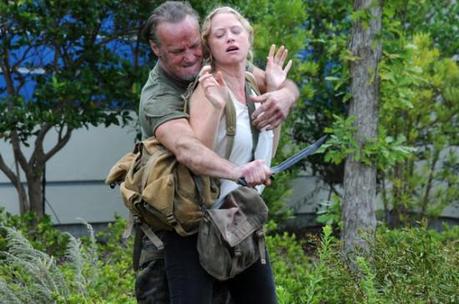Contributor: Henry T.
Written by Anne Cofell Saunders
Directed by Felix Alcala
Now, this is an improvement. It’s not a big improvement because the various subplots of the show are still too scattered to be substantive, but at least I didn’t find too many logical holes in this episode as I did in the others. Instead of going for the mythology angle by teasing more clues as to why the power went out fifteen years ago, this episode went for the gut and appealed to the emotional side of things.

The audience needs to feel a sense of what these characters lost when the power went out. That is crucial if we are to continue to follow these people wherever they are trying to go. When all of the power goes out in the world, the comforts in life that everyone takes for granted are gone. The show has gone to great lengths so far to appeal to the action quotient (that does continue here) over other things it can do, but the more effective to demonstrate the risks in something as simple as venturing out into the wild. Perhaps seeing death and danger first hand can also result in a change of mentality by one of the show’s lead characters. That would mean the series is developing and changing with each passing episode.
The episode reunites two of the show’s traveling parties when Miles and Charlie catch up with Aaron and Maggie at a designated location. Charlie still remains an annoyance at this point when she questions what direction everyone is going in and whether she can trust her uncle since he is so dangerous according to everyone they run into. To be fair, those are legitimate questions, but the actress delivers them in such a way that makes viewers like myself want to reach into their television and slap some sense into her. Everywhere they go, though, the group runs into danger. There is danger lurking everywhere, even as it seems like the United States is an empty wasteland without many people venturing outside.
Here’s something I’ve wondered ever since the show premiered: If most of the major cities are deserted (as the show’s intro suggests), wouldn’t the countryside or small cities be filled with people? How is it that a futuristic Chicago is the most crowded place we’ve seen so far? Anyway, this is slowly building to something, as we see when a dog bites Aaron. Field medicine can only last so long if the group continues to run blithely into dangerous situations all the time. It leads to Maggie getting stabbed by a guy who follows the group to his hideout. He claims revenge on Maggie for killing one of his dogs.
Up until this point, Maggie has been a largely ineffectual character. This episode fills in her backstory, and it’s quite an effective one. She was communicating with her kids as the blackout occurred and wandered the land desperately trying to get back to her kids in England. When she tells this story to Miles, it’s a powerful moment filled with some affecting imagery and very little words. Maggie’s kids were everything to her, and when she lost all hope, Ben pulled her back from the brink.
Of course, little time is dispensed before the stabbing occurs, and it’s elementary that Maggie becomes the first major character on this show to die. Her death — unlike her short lifespan on this show — was handled with grace and weight, though. It was something I did not expect from Revolution, especially coming this early in the series’ run. Charlie witnesses all of this death and violence around her. I’m hoping she can come to her senses now; that she is living in a dangerous and unforgiving world, and that being good and innocent can only get you so far. It only increases the chances that you could die.
The other subplots presented in the episode harken back to what many of the adult characters lost after the lights went out. Captain Neville is trapped in a barn with Danny after a storm threatens the current location of Neville’s camp. I have also wondered how weather concerns will factor into the action of this series. People out in the wild have little protection against the wrath of Mother Nature so it will be interesting if the show addresses that concern going forward.
It’s a relatively light subplot, mostly showing the different perspectives of the post-blackout days between Neville and Danny. Neville’s cynicism was shaped in the desperate days immediately following the blackout. Danny probably doesn’t remember those days since he was so young. Neville remains a steady and reliable character, mainly because of the actor playing him, but he needs something more to do than to essentially babysit Danny to eventually deliver him to Monroe. This is part of the scattered nature of the series being shown right now.
It would be exponentially more interesting, for example, to see how Miles would interact with Neville or how Monroe reacts to the return of his former friend and second-in-command. Monroe is mainly continuing to interrogate Rachel in this episode, and his menace is more implied than actually shown, which is a different approach for villains in a television series like this. Rachel’s flashback adds to the emotional wallop this whole episode packs, though. You feel the sadness and tragedy when Rachel abandons her family to give herself up to the then-growing Monroe militia.
How that plays out is going to be intriguing to watch in future episodes. This episode gives me something besides Captain Neville to hook me. It goes beyond finding out the reason why the lights went out (much like ignoring the true nature of the island on “Lost”), and if the show can continue to get me to invest in the characters like this, then I can finally feel optimistic about the direction of it all.
Score: 7/10

